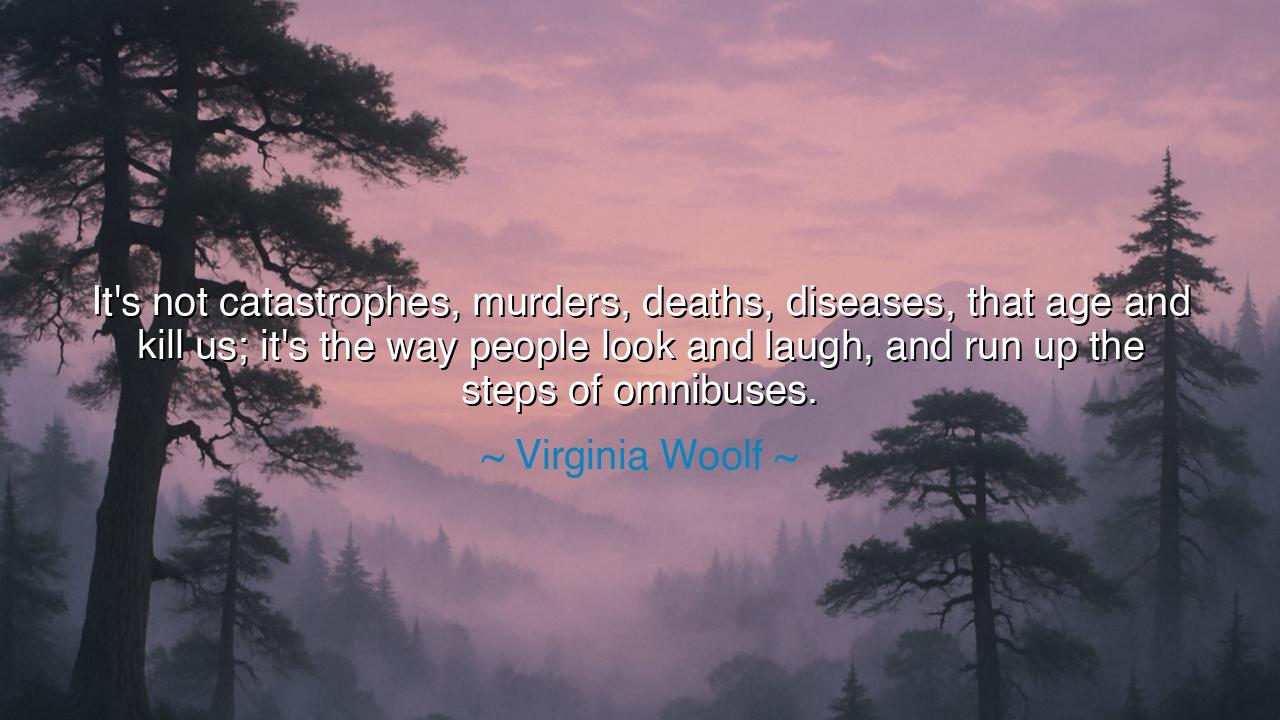
It's not catastrophes, murders, deaths, diseases, that age and
It's not catastrophes, murders, deaths, diseases, that age and kill us; it's the way people look and laugh, and run up the steps of omnibuses.






Harken, O children of the future, to the words of Virginia Woolf, whose understanding of life’s delicate balance speaks to the very essence of what it means to grow old in a world that often passes us by. She once said, "It's not catastrophes, murders, deaths, diseases, that age and kill us; it's the way people look and laugh, and run up the steps of omnibuses." These words, though seemingly simple, carry a deep and powerful truth about the quiet, often unnoticed ways in which society and perception shape our experience of aging. It is not the grand tragedies of life that erode our vitality, but the subtle dismissals, the overlooked slights, the small neglects that weigh on our hearts and minds, and thus, wear away the spirit.
In the ancient world, the elders were not just seen as those who had lived long, but as those who carried the wisdom of the ages. They were revered for their ability to see through the storms of life, to offer counsel that had been earned through years of experience and reflection. Yet, there was always a tension—a struggle between the body’s frailty and the spirit’s strength. Just as Socrates knew that the physical body could weaken, he also understood that the soul’s strength was tied to its ability to endure and reflect. Similarly, Woolf acknowledges that it is not the obvious calamities of life that wear us down, but the quiet cruelty of indifference and exclusion that gradually erode our sense of self and worth.
Woolf’s observation speaks to the often invisible forces of society, which define how we are seen and treated as we age. The simple act of being looked at with disdain, the harsh laughter that mocks the frailties of the older body, the hurried movements of the younger generation—all of these small things, when added together, create a cumulative weight on the soul. Aging in such an environment becomes an act of resilience against not just the physical ravages of time, but against the invisible wounds inflicted by the eyes and actions of others. It is in the way we are perceived—in the way others treat us—that we can feel most vulnerable, as if we have somehow become invisible to the world, irrelevant to the younger, more vibrant forces around us.
Consider, O wise ones, the story of King Lear, that tragic figure from the great playwright Shakespeare. Lear’s downfall was not just in the loss of his kingdom, nor in the betrayal of his daughters, but in the loss of his dignity as he was reduced to a broken old man. His age, once a symbol of wisdom, became instead a source of scorn and mockery, especially in his own household. The laughter and dismissal of Lear’s frailty by his daughters tore at his heart, leaving him to question his value in a world that no longer saw him as a figure of authority. The true tragedy of Lear is not simply that he loses his crown, but that he loses the respect that once came with his position. This, Woolf reminds us, is the deeper wound of aging: it is not the physical decline, but the societal rejection that causes the most suffering.
This rejection, though less dramatic than the events of Lear’s tragedy, is something we face each day in subtle ways. Woolf’s words bring to light how the small, everyday interactions—the laughter, the dismissive glances, the hurried footsteps of those who pass by—can contribute to the quiet death of the spirit. It is the neglect of the elderly, the constant reminder that they are no longer part of the vibrant world around them, that chips away at their sense of self. The young run past the steps of their elders without looking back, and the elders, in turn, are left to wonder if they still have a place in the world they once shaped.
Yet, O children, the lesson here is not one of despair, but of awareness. Just as the ancients taught that the strength of the spirit lies in its ability to endure, so too must we learn to strengthen the spirit of those who are aging, to acknowledge them, to see them for who they truly are. In every laugh, in every glance, in every act of kindness, we must find ways to lift up those who have carried us before. Let us not rush past the elderly as though they are mere shadows of their former selves, but let us take the time to honor their presence, to listen to their stories, and to treat them with the respect and dignity they deserve.
Therefore, O children, remember the words of Virginia Woolf: the greatest tragedy of aging is not in the physical decline, but in the rejection that comes from others. Treat your elders with reverence, for their wisdom and experience are treasures that time has bestowed upon them. Look at them, listen to them, and value them for the path they have walked and the legacy they carry. In doing so, you will ensure that aging is not a time of isolation, but a time of connection, a time where both the young and the old can share in the richness of life, learning from each other in the bond of mutual respect. May you, too, grow old not with sorrow, but with the peace of knowing you are seen and appreciated by those who follow in your footsteps.






AAdministratorAdministrator
Welcome, honored guests. Please leave a comment, we will respond soon